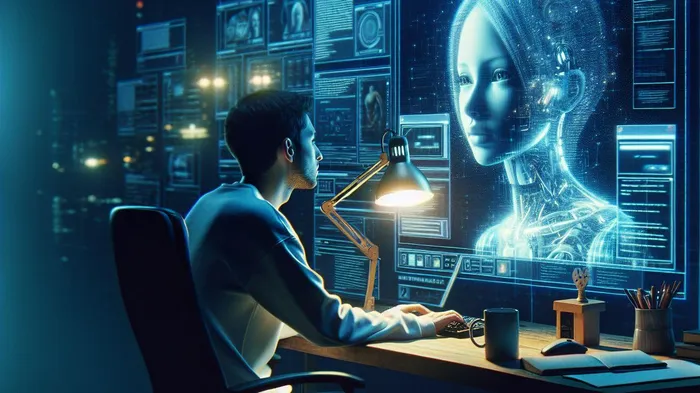The last generation to learn the old way: How AI can reshape education and learning
The future is young and full of opportunity
Most African governments have consistently failed to meet global and regional education funding targets to ensure quality public education, Human Rights Watch reported earlier this month. The 2025 theme for the Day of the African Child is “planning and budgeting for children’s rights: progress since 2010.” Yet only one-third of African countries met the globally endorsed education funding benchmarks between 2013 and 2023. That dropped to just one-quarter by 2022. Fourteen African countries didn’t meet the target even once in a decade. This paints a sobering picture. But it doesn’t have to be this way.

Stellenbosch University is leading a global trial to enhance TB diagnosis using AI
Image: RON AI
With more than 60% of the continent’s population under the age of 25, the future is young and full of opportunity. Artificial intelligence is creating entirely new pathways to reimagine education. We have the tools and the talent to equip our youth for a bigger, brighter future. Education and learning are set to be fundamentally disrupted. But because education funding targets aren’t being met, we’re already falling behind. The good news? The solution is within our reach and we can turn this around.
Taking a step back, it’s important to understand that the education system as we know it was designed for the Industrial Age, a one-size-fits-all model built to prepare students for one career, not the fast-evolving future we find ourselves in now. But our children are growing up in a radically different world. Exponential technologies are rewriting the rules of learning, creativity and human achievement. We are standing at the edge of a profound transformation. The kids of today will be the last generation to learn in the static, linear ways we did. The rise of artificial intelligence is ushering in a new educational paradigm: one that is personalised, dynamic, interactive and profoundly human.
In the coming years, additional to an increased focus on life skills, every learner will have an AI tutor, an adaptive, empathetic companion capable of understanding not just what they know, but how they learn best. These AI tutors will design custom learning paths, accelerating mastery of knowledge while nurturing deeper creativity and critical thinking. No more standardised testing to the mean. No more passive classrooms. Education will become an organic, living process that evolves with each learner – if we enable it to. And here lies the magic key that can unlock it all: bridging the digital divide.
Insufficient public spending on education doesn’t just jeopardise the right to quality education, it threatens our ability to unlock the full potential of AI for learning. Without reliable electricity, internet connectivity or access to basic digital tools, many schools, particularly in rural areas, remain disconnected from the very technologies that could transform their futures. South Africa is no exception. While some urban schools experiment with robotics and coding, many others still operate in analogue mode. This lack of infrastructure poses a serious risk to the country’s ability to harness AI and future-facing technology in education.
But it’s not too late. Bridging this gap is about more than fairness. It is a national imperative. In a country grappling with high youth unemployment and growing social unrest, investing in relevant, future-proof education is one of the most powerful tools we have to break the cycle. So yes, the Department of Communications has developed a national AI strategy, but it does not go far enough to mitigate these risks or provide the infrastructure that is needed. If we do not act now, our country may find itself further behind in the global digital economy. The lack of access to AI-driven opportunities will entrench inequality. This is why it is critical that technological advancement serves all citizens and not just a privileged few.
As Ray Kurzweil teaches, technology progresses exponentially and so too does the potential for human development. AI can help us transcend cognitive limits, but it’s the human factor, collaboration, empathy, imagination, that will define our future. In this new world, the most valuable skills won’t be memorisation or rote knowledge, but the ability to solve complex problems together, to think creatively, and to work fluidly alongside intelligent systems.
Schools have the potential to evolve into innovation labs where students take on real-world challenges with AI, learning not only content, but how to shape the world. Working with AI optimally, not just using it in a transactional way, will become a fundamental part of education. Children need to grow up seeing AI as a partner, a co-creator, and a powerful amplifier of their abilities.
Spatial computing will play a critical role in this shift. The metaverse is already emerging as a powerful learning environment, a rich, immersive layer where students can engage with knowledge experientially. Imagine walking through a living cell, debating philosophy with an AI-powered Socrates, or designing virtual cities with classmates across continents. Platforms like UBU are pioneering this next frontier, blending AI, blockchain and immersive environments to redefine what learning can be, and making it accessible to those who can connect.
As Peter Diamandis reminds us, the only constant is accelerating change. Our education systems must reflect that reality. To reclaim the future, South Africa’s youth need an economy that includes and uplifts them. The greatest gift we can give the next generation is not just content from the past, but the tools, mindsets and platforms to create the future.
We are raising a new generation of explorers, human - AI hybrids capable of unimaginable creativity and collaboration. The classroom of tomorrow won’t have four walls. It will be an infinite canvas, where learning is lifelong, personalised, and powered by AI. And that future is arriving faster than we think. If we are to future proof our continent, Africa must benefit from this revolution too and it’s up to all of us to make sure that this happens.